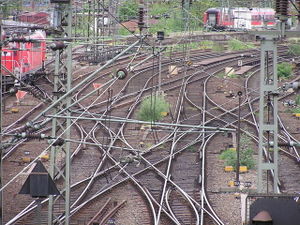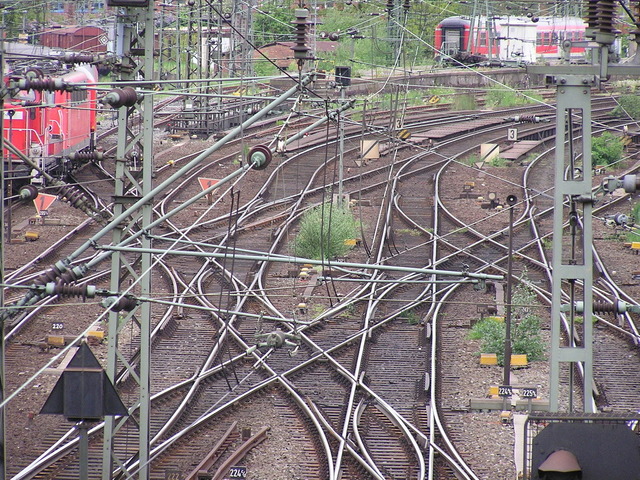Transport

Rail transport is of great importance in the modern economy
Transportation - a separate set of activities related to movement of people and property by appropriate means (e.g. truck, car, aircraft, railway, ship, etc.).
Transport in connection with production and sales is part of the logistics chain. Its role is crucial in achieving the primary objective, which is to optimize the use of resources of production factors, by optimizing the time and place of their utilization in the economy.
Contents
- 1 Role of transport in logistics and economy
- 2 Transport as a factor of Gross Domestic Product
- 3 Measurement of transport in GDP
- 4 References
Role of transport in logistics and economy
Transport enables movement of goods between places and creates a bridge between buyer and seller. Transport service provider affects the efficiency of the operation of other units functioning in the supply chain. Transport service provider often determines the company's competitiveness and the demand for the products of this company.
The choice of means of transport has a major impact on the cost, timely delivery, and on the condition of the goods transported. This affects satisfaction of the final customer for transported goods. Delivery of goods is carried out by different means of transport.
We can distinguish five modes of transport: transportation by railways, aircraft, trucks, ships and pipelines. Selection decisions must take into account their speed, frequency, capacity, reliability, access, and cost. If speed is the most important, the best solution would be air or road transport.
If the main criterion is the low cost, it is best to choose the sea route or the pipeline. Road transport fulfils most of these criteria. Freight forwarder (i.e. person or company engaged in the paid transportation of things) combine two or more modes of transportation through containerization.
Transport as a factor of Gross Domestic Product
Transportation in GDP is an important macroeconomic measure of the extent to which we can assess the importance of transport in economy. Transport in GDP means the ratio of the expenditure incurred on transport activities to the outcomes achieved by other sectors or social activities supported by the transport, or in other words, it is a condition of involvement of transport activities in the other areas of the economy. It is measured by the value of transport expenditures incurred to produce a unit of national income.
The demand for transport services depends on the size of the economy and scale of business activity.
Measurement of transport in GDP
Transport in GDP can be measured by various metrics depending on its significance for economic development:
- tons of freight related to the unit value of the gross national product and national income.
- tonne-kilometers of transport work related to the unit value of the gross national product and national income.
- value of transport and other services, transport core activities related to the unit value of the gross national product and national income.
Ratio of transport in GDP results from the degree of cooperation with the different zones of transport activity in the economy. Transport volume depends on amount of involved materials, energy and labour, or how much raw materials, power and labour activities it consumes. Degree of transport volume, which is dependent on various activities undertaken in the sphere of economy and society.
The size of transport in GDP depends largely on the amount of manufactured products, factors which enable the smooth functioning of the economy (level of development of the production system, turnover, management etc.) and the number of movements of population.
| Transport — recommended articles |
| Production — International division of labor — International logistics — Standard price — Operational management — Logistics system — Distribution logistics subsystem — Logistic process — Returns of goods, waste and recyclables logistics subsystem |
References
- Coyle, B., & Bardi, E. J. (2003). Langley. The Management of Business Logistics.
- England, R. W. (1998). Measurement of social well-being: alternatives to gross domestic product. Ecological Economics, 25(1), 89-103.
- Frémont, A., & Franc, P. (2010). Hinterland transportation in Europe: Combined transport versus road transport. Journal of Transport Geography, 18(4), 548-556.
- Gross, M., & Feldman, R. (1998). National Transportation Statistics (1997). DIANE Publishing.
- Litman, T., & Burwell, D. (2006). Issues in sustainable transportation. International Journal of Global Environmental Issues, 6(4), 331-347.
- Santos, G., Behrendt, H., & Teytelboym, A. (2010). Part II: Policy instruments for sustainable road transport. Research in Transportation Economics, 28(1), 46-91.
- Tseng, Y. Y., Yue, W. L., & Taylor, M. A. (2005). The role of transportation in logistics chain. Eastern Asia Society for Transportation Studies.

